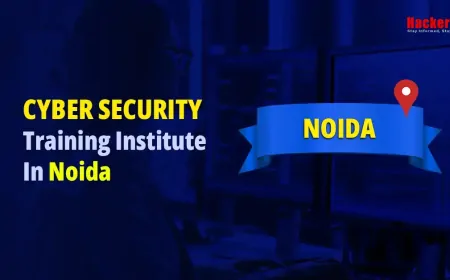What Are the Challenges Students Face in Cybersecurity Degree Courses in Pune (Labs, Faculty, Exposure etc.)
Imagine diving into a world where every click could be a potential threat, and your job is to stay one step ahead of invisible attackers. That is the thrill of cybersecurity, a field that has exploded in importance as our lives become more digital. In Pune, known as India's Oxford of the East and a major IT hub, thousands of students flock to degree programs in cybersecurity each year. These courses promise to equip young minds with skills to protect data, networks, and systems from cyber threats like hacking or ransomware, which is software that locks files until a ransom is paid. But behind the excitement lies a set of hurdles that can make the journey tough. From outdated labs to scarce industry exposure, students often find themselves navigating a maze of challenges. This blog takes a close look at these issues, drawing from student experiences, reviews, and recent trends as of 2025. If you are considering a cybersecurity degree in Pune or just curious about the field, read on to understand what really goes on in these programs. We will break it down simply, so even if you are new to tech, you can follow along.

Table of Contents
- Overview of Cybersecurity Education in Pune
- Challenge 1: Access to Labs and Resources
- Challenge 2: Faculty Expertise and Availability
- Challenge 3: Industry Exposure and Internships
- Challenge 4: Keeping Curriculum Relevant and Updated
- Challenge 5: High Competition for Admission
- Challenge 6: Financial Burden and Costs
- Challenge 7: Workload and Mental Health
- Challenge 8: Diversity and Inclusion Issues
- Summary Table of Key Challenges
- Conclusion
- Frequently Asked Questions
Overview of Cybersecurity Education in Pune
Pune has positioned itself as a key player in India's cybersecurity landscape. With over 40 colleges offering related degrees, from B.Sc. in Cyber Security to B.Tech in Computer Science with cybersecurity specializations, the city attracts students from across the country. Institutions like MIT World Peace University, D.Y. Patil International University, and Indira College of Commerce and Science lead the pack. These programs typically last three to four years, covering topics like ethical hacking, which is legally testing systems for weaknesses, network security, and digital forensics, the process of investigating cyber crimes through digital evidence. The National Education Policy 2020 has influenced many, introducing flexible credits and practical focus. However, as the field grows, with India's cybersecurity market expected to reach USD 12.9 billion by 2030, so do the demands on education. Students enter with high hopes, but soon encounter realities like resource limitations. Recent reports highlight a skills gap, where graduates struggle with real-world applications despite theoretical knowledge. This overview sets the stage for diving into specific challenges, based on student reviews and industry insights.
The appeal of Pune lies in its IT parks, like Hinjewadi, home to companies needing cybersecurity pros. Yet, this vibrancy brings pressure: high expectations for hands-on skills in a competitive job market. As we explore, keep in mind that while challenges exist, many students overcome them through persistence and networking.
Challenge 1: Access to Labs and Resources
One of the biggest hurdles for students in Pune's cybersecurity programs is getting enough hands-on practice in labs. Cybersecurity is not just about reading books: it requires simulating attacks, analyzing malware, which is harmful software, and using tools like Wireshark for monitoring network traffic. However, many colleges, especially smaller ones, lack modern equipment. Student reviews on platforms like Shiksha mention outdated computers or software that does not match industry standards. For instance, in some programs, labs are shared among hundreds of students, leading to limited access time. This means you might only get a few hours a week to practice, which is not enough to build confidence.
Under the NEP 2020, colleges are pushing for more practical training, but implementation varies. In Pune, smaller institutions struggle with infrastructure for four-year programs, as noted in recent analyses. Funding is a key issue: high-end servers for cloud security simulations or virtual machines for ethical hacking setups cost a lot. Students often resort to personal laptops, but not everyone can afford powerful ones. Take Rahul, a fictional but typical third-year student at a mid-tier college: "We learn theory fine, but when it comes to labs, the tools crash or are too old. It frustrates us because jobs expect experience with current tech." This gap can leave graduates underprepared, highlighting the need for better resource allocation.
Moreover, access to online resources like paid platforms for certification prep adds to the problem. While some colleges provide subscriptions, others do not, forcing students to pay out of pocket. As the field evolves with threats like AI-driven attacks, labs must update, but budget constraints slow this down. Overall, this challenge affects skill development, making it harder for beginners to grasp complex concepts through practice.
Challenge 2: Faculty Expertise and Availability
Finding qualified teachers is another common issue in Pune's cybersecurity courses. The field demands instructors with real-world experience, not just academic credentials. However, many faculty members come from traditional computer science backgrounds and lack up-to-date knowledge on emerging threats like quantum computing risks or AI in cybersecurity. Student feedback on Quora and Reddit often points to this: "Professors teach from slides, but when we ask about recent hacks, they struggle to explain," says one anonymous review.
In Pune, the rapid growth of programs has outpaced faculty hiring. Top colleges like COEP have better staff, but others rely on part-timers who juggle jobs, leading to inconsistent teaching. Availability is key: with large class sizes, personal guidance is rare. For beginners, this means struggling with basics like cryptography, the science of secure communication, without enough support.
Training faculty is challenging too. Workshops exist, but not all attend. As per 2025 trends, the skills gap in educators mirrors the industry shortage, with India needing over a million pros. Students like Priya note: "Our sir is great at theory, but for practicals, we learn from YouTube." This self-reliance helps some, but others fall behind. Addressing this requires colleges to partner with industry for guest lectures, though that is not always enough.
Challenge 3: Industry Exposure and Internships
Getting real-world experience is tough for many students. Pune's IT ecosystem offers opportunities, but competition for internships is fierce. Cybersecurity firms prefer candidates with prior skills, creating a catch-22: you need experience to get experience. Reviews from Suryadatta Institute mention limited placement ties. Many programs promise exposure through projects, but these are often simulated, not live.
Internships are crucial for learning tools like penetration testing, simulating attacks to find vulnerabilities. Yet, only top colleges have strong networks. For others, students apply independently, facing rejections. In 2025, with rising threats, companies are cautious about letting interns handle sensitive data. Language barriers or low digital literacy in some backgrounds add layers, especially for rural students in Pune programs.
A student story: Amit spent months emailing companies, only to get unpaid roles with little learning. "We study threats, but seeing them in action is different." Colleges are improving with hackathons, but more structured exposure is needed to bridge this gap.
Challenge 4: Keeping Curriculum Relevant and Updated
The fast pace of cybersecurity makes curricula outdated quickly. Threats like ransomware evolve, but syllabi might not. In Pune, NEP 2020 pushes updates, but small colleges lag. Students complain about focusing on old topics while ignoring AI or IoT security, protecting connected devices.
Updating requires resources and expertise. Reviews note challenging structures but gaps in modern content. For beginners, this means learning irrelevant material, wasting time. Colleges are adding electives, but core changes are slow. As 2025 predictions show sophisticated attacks, students must self-study, adding burden.
Challenge 5: High Competition for Admission
Getting into a good program is a battle. With limited seats in top colleges like DIAT Pune, competition is high. Eligibility needs strong 12th marks in science, plus entrances like JEE or CUET. Many prepare for years, but not all succeed, leading to lesser options with more challenges.
In Pune, the IT boom draws crowds, raising cutoffs. Students from non-tech backgrounds face extra hurdles, needing bridge courses. This pressure can deter potential talent.
Challenge 6: Financial Burden and Costs
Money is a big barrier. Fees range from 1 lakh to 19 lakhs for UG, higher in private colleges. Certifications like CEH cost more, with exams and materials expensive. Scholarships help, but not always available.
For middle-class families, this strains budgets. Additional costs for laptops or software add up. Reviews highlight affordability issues in Pune's programs.
Challenge 7: Workload and Mental Health
The intense curriculum leads to burnout. With projects, exams, and self-study, students juggle a lot. Mental health suffers, with little support in some colleges. The field's stress, thinking like hackers, adds pressure.
In Pune, competitive peers amplify this. Students report long hours, affecting well-being.
Challenge 8: Diversity and Inclusion Issues
The field is male-dominated, with women facing bias. Rural or underrepresented students deal with cultural gaps. Colleges are improving, but inclusion remains a challenge.
Summary Table of Key Challenges
To recap, here is a table summarizing the main challenges and potential impacts.
| Challenge | Description | Impact on Students |
|---|---|---|
| Labs and Resources | Limited access to modern equipment | Poor practical skills |
| Faculty Expertise | Lack of updated knowledge | Inadequate guidance |
| Industry Exposure | Few internships | Job readiness gap |
| Curriculum Updates | Outdated content | Irrelevant learning |
| Admission Competition | High entry barriers | Stress and exclusion |
| Financial Burden | High fees and costs | Limited access |
| Workload | Intense schedules | Burnout |
| Diversity | Inclusion gaps | Unequal opportunities |
Conclusion
In wrapping up, cybersecurity degrees in Pune offer exciting prospects, but challenges like lab access, faculty issues, and exposure gaps test students' resolve. From financial strains to workload stress, these hurdles highlight areas for improvement. Yet, with persistence and resources like online communities, many succeed. As Pune evolves, addressing these will strengthen its role in cybersecurity education. If pursuing this path, weigh these factors and prepare accordingly.
Frequently Asked Questions
What are the main lab challenges?
Limited modern equipment and shared access reduce practice time.
How does faculty expertise affect learning?
Outdated knowledge leads to poor guidance on new threats.
Why is industry exposure hard?
Competition for internships and company caution limit opportunities.
Is curriculum always up-to-date?
No, rapid field changes make updates slow in some colleges.
What makes admission competitive?
High demand and strict eligibility like entrances increase pressure.
Are courses expensive?
Yes, fees vary widely, plus certification costs add burden.
Does workload cause stress?
Intense studies and projects often lead to burnout.
Are there diversity issues?
Yes, underrepresentation and bias affect some groups.
Which colleges have better labs?
Top ones like MIT-WPU invest more in resources.
How to overcome resource limits?
Use personal tools and online platforms for practice.
What certifications help?
CEH or CISSP, but they cost extra.
Is Pune good for cybersecurity?
Yes, due to IT hub status, despite challenges.
How to get internships?
Network and apply early through college or directly.
Do programs include AI security?
Some do, but not all update quickly.
What entry exams are needed?
JEE, CUET for UG, GATE for PG.
Are scholarships available?
Yes, merit or need-based in many colleges.
How long are degrees?
3-4 years for UG, 2 for PG.
What skills are hardest to learn?
Ethical hacking and forensics require practice.
Can non-tech students join?
With bridge courses, but science background helps.
Where to find reviews?
Shiksha, Quora, or college sites.
What's Your Reaction?










































































